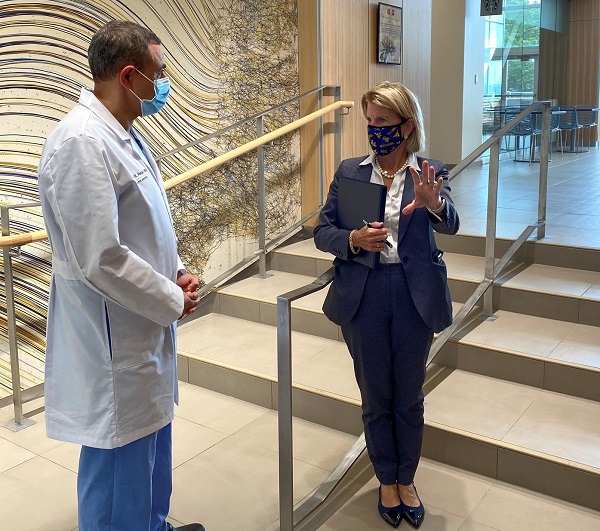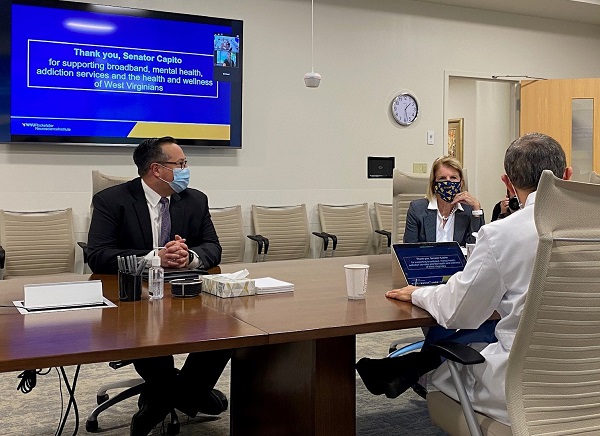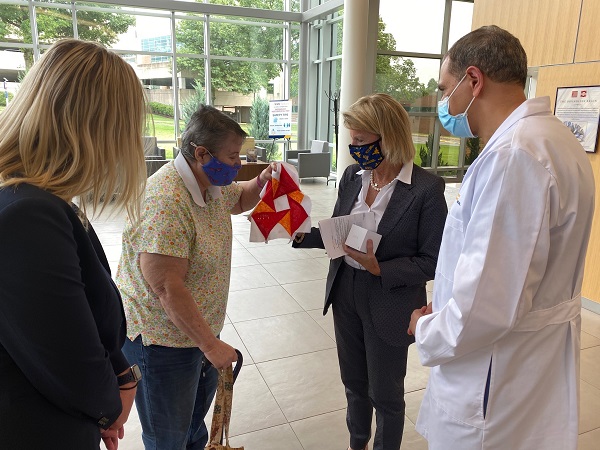MORGANTOWN, W.Va. – U.S. Senator Shelley Moore Capito (R-W.Va.) today concluded her day in Monongalia County with a visit to the West Virginia University (WVU) Rockefeller Neuroscience Institute (RNI) to meet with Director Dr. Ali Rezai.
During the visit, Senator Capito received an overview from RNI about their COVID-19 response efforts and telemedicine advancements. Additionally, Senator Capito learned more about RNI’s research collaboration with Oura Health—a technology company that has collaborated with RNI to conduct a national study designed to accelerate the early detection of the COVID-19 virus symptoms and contagiousness.
“RNI is a world class research institute that is working on groundbreaking research, including a variety of neurological diseases and also the current COVID-19 pandemic,” Senator Capito said. “I was so impressed with the good work they are doing here and was impressed by the research advancements they are making right here in West Virginia, which ultimately benefit the entire country—and, in some cases, the world. I’ve been a strong partner for RNI and WVU Health, consistently advocating for and providing federal funding to support their research efforts and will continue to do so. I also look forward to seeing the results that come out of their Oura Ring study, which will help provide data based feedback to accelerate the early detection of coronavirus symptoms and contagiousness. As we navigate new territory during this pandemic, every bit of research counts, and I’m glad WVU will continue to play a role.”
“We appreciated the chance to talk with Senator Capito about the importance of telehealth and broadband to serve more West Virginians in new ways. It was also a privilege to share our first in the world research and our COVID-19 health forecasting study that could be a game changer for public health in the future. All of this innovation is happening right here in West Virginia with the help of our supportive leaders,” said Ali Rezai, MD Executive Director of WVU Rockefeller Neuroscience Institute.
BACKGROUND ON WVU AND OURA RING PARTNERSHIP:
Earlier this year, RNI, in conjunction with Oura Health, announced their capability to detect COVID-19 related symptoms up to three days in advance through a digital platform. The primary goal of the nationwide study is to leverage the capabilities of the Oura Ring—a fitness and health tracking device—to gather data from the user, coupled with RNI’s data gathering and research team.
One of the many obstacles with the virus has been the spreading of COVID-19 by asymptomatic individuals who are not aware they are infected. According to WVU Medicine, the RNI platform uses the Rockefeller Neuroscience Institute app, the Oura Ring, and artificial intelligence (AI) guided models to forecast and predict the onset of COVID-19 related symptoms (e.g. fevers, coughing, breathing difficulties, fatigue, and others) three days in advance with over 90 percent accuracy. This technology can potentially serve as a critical decision making tool to help contain the spread of the virus, safely re-open communities, strengthen the economy, and facilitate public health containment strategies.
The RNI app is now available for the general public by visiting: WVUMedicine.org/RNI/COVID19.
Photos from today’s visit are included below:

Senator Capito hears from Dr. Rezai about RNI’s COVID-19 response efforts and telemedicine advancements.

Senator Capito sits down with RNI leadership to discuss the research and development taking place at RNI with the Oura Ring.

Senator Capito meets an RNI patient who is now relearning how to stitch following her brain surgery.
# # #